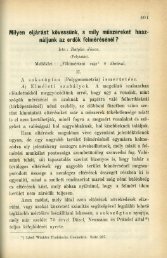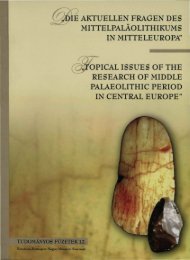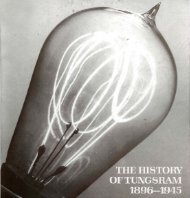national populism and slovak â hungarian relations in - MEK
national populism and slovak â hungarian relations in - MEK
national populism and slovak â hungarian relations in - MEK
You also want an ePaper? Increase the reach of your titles
YUMPU automatically turns print PDFs into web optimized ePapers that Google loves.
Approach<strong>in</strong>g National Populism12 In fact, the purest anti-establishment party from among the mentioned was NDSV. While,SOP <strong>and</strong> namely DP had certa<strong>in</strong> leftist t<strong>in</strong>t, RP, but namely JL declared themselves centreright. The message which resonated among electorates, <strong>and</strong> thus delivered then electoralreturns, though, was the criticism of establishment.13 More often than not, the life-span of those parties proved to be short; they either vanishedor transformed through adopt<strong>in</strong>g a more traditional ideological profile. For the fortunes ofthe parties at issue see Uèeò 2007a.14 For a complete discussion of the transformation <strong>populism</strong>, we would have to take <strong>in</strong>toaccount also the ‘delayed’ emergence of the PRR Ataka <strong>and</strong> the successful anti-establishmentdrive of Boyko Borissov <strong>and</strong> his GERB <strong>in</strong> Bulgaria.15 We are somewhat uneasy with call<strong>in</strong>g Mr. Meèiar’s rule a regime but do not exclude it.16 This attempt could be easily traced <strong>in</strong> the textual analysis of the newspapers SlovenskáRepublika <strong>and</strong> Nový deò, as well as weekly Extra.17 Or still otherwise: “Among parties represent<strong>in</strong>g ethnic Slovaks, Meèiar’s HZDS propelledthe <strong>in</strong>tegration of multiple <strong>national</strong>isms <strong>in</strong>to a s<strong>in</strong>gle, <strong>in</strong>creas<strong>in</strong>gly well articulated message.From a position that Slovaks had faced multiple <strong>national</strong> threat, HZDS leaders graduallymoved to a position that the new country’s enemies were <strong>in</strong> fact one <strong>and</strong> the same,because opposition leaders – Slovaks without strong <strong>national</strong>ist feel<strong>in</strong>gs – had conspiredwith the Hungarian m<strong>in</strong>ority <strong>and</strong> representatives of NATO, the EU, <strong>and</strong> multi<strong>national</strong> corporationsto elim<strong>in</strong>ate Slovakia’s <strong>in</strong>dependence” (Deegan-Krause, 2004, 691).18 That politicisation was not to attract the new voters. After all, from 1994 the vot<strong>in</strong>g choicebased on <strong>national</strong>ism has been stabilized – those who were not <strong>national</strong>ists would notbecame them, <strong>and</strong> vice versa. The politicisation, however, was capable of chang<strong>in</strong>g supportersm<strong>in</strong>d as to which k<strong>in</strong>d of <strong>national</strong>ist sentiment they ‘approved’ to be cultivated bythe rul<strong>in</strong>g group.19 “[M]any <strong>national</strong>ist movements use an emancipatory discourse <strong>in</strong> which the nation (equatedwith the ‘true’ people) is to be liberated from foreign dom<strong>in</strong>ation (as, for <strong>in</strong>stance, <strong>in</strong>the form of the ‘transfer’ of Western <strong>in</strong>stitutions) <strong>and</strong> domestic subjugation to politicalélites. In these discourses, an argument is often made for <strong>in</strong>creased popular sovereigntythrough the grant<strong>in</strong>g of absolute priority to the nation, <strong>in</strong> other words, to the people as anundivided <strong>and</strong> organic unity, <strong>and</strong> the expression of its will” (Blokker 2005, 377).20 We tend to concur with Deegan-Krause that the essence of HZDS’ authoritarianism wasan attempt to underm<strong>in</strong>e mechanisms of horizontal accountability <strong>in</strong> order to elim<strong>in</strong>atetheir constra<strong>in</strong>ts on further<strong>in</strong>g the <strong>national</strong> populist project.21 Other explanation for the <strong>relations</strong>hip of authoritarianism <strong>and</strong> <strong>national</strong>ism offers Snyder(2000, 332, cited <strong>in</strong> Hearn 2006, 134): “Democratization produces <strong>national</strong>ism when powerfulgroups with<strong>in</strong> the nation not only need to harness popular energies to the tasks ofwar <strong>and</strong> economic development, but they also want to avoid surrender<strong>in</strong>g real politicalauthority to the average citizen. For those élites, <strong>national</strong>ism is a convenient doctr<strong>in</strong>e thatjustifies a partial form of democracy, <strong>in</strong> which an élite rules <strong>in</strong> the name of the nationyet may not be fully accountable to its people. Under conditions of partial democratizationelites can often use their control over the levers of government, the economy, <strong>and</strong>the mass media to promote <strong>national</strong>ist ideas, <strong>and</strong> thus set the agenda for the debate.Nationalist conflicts arise as a by-product of élites’ efforts to persuade the people to acceptdivisive <strong>national</strong>ist ideas.” While appreciat<strong>in</strong>g the <strong>in</strong>sight, we take the view that explanationof <strong>national</strong>ism as a straightforward tool for the authoritarians has a limited power.22 Recent warm realtionships between Ján Slota <strong>and</strong> Kia, a representative of not only the foreignbut even the ‘foreign race’ capital, is a tell<strong>in</strong>g (but not the only one) example of that.National Populism <strong>and</strong> Slovak – Hungarian Relations <strong>in</strong> Slovakia 2006 – 2009. Forum M<strong>in</strong>ority Research Institute Šamorín – Somorja, 200937


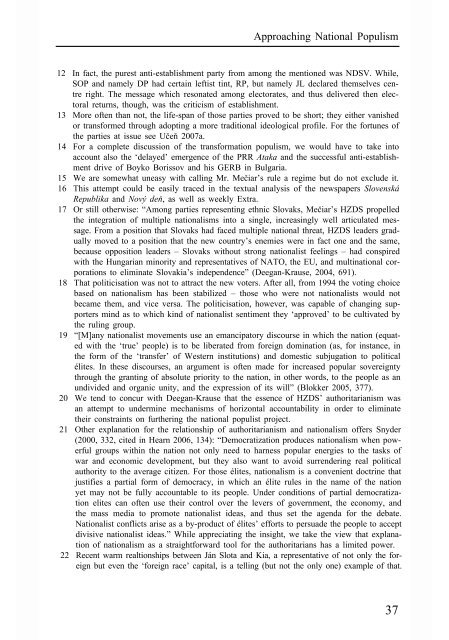
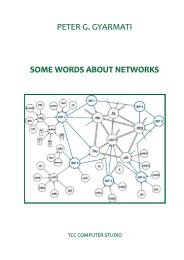

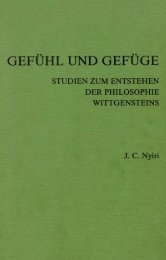
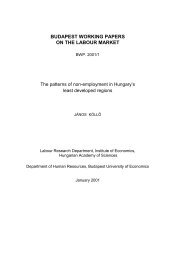

![Letöltés egy fájlban [4.3 MB - PDF]](https://img.yumpu.com/50159926/1/180x260/letaltacs-egy-fajlban-43-mb-pdf.jpg?quality=85)

